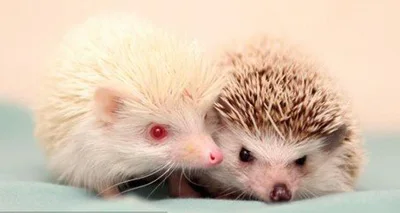Variety Overview
The mini hedgehog, scientifically known as the African Pygmy Hedgehog, hails from Africa. Known for its gentle nature and slender physique, it can even fit into teapots and egg cups. These creatures are typically hypoallergenic and are active at night while resting during the day.
Raising miniature hedgehogs necessitates maintaining an environment above 21°C (70°F). Due to their climbing abilities, iron cages are unsuitable for them. These small creatures are susceptible to various health issues such as digestive problems, fatty liver disease, and heart conditions. Typically, their lifespan ranges from 3 to 8 years. However, contracting the paralyzing “Wobbly Hedgehog Syndrome” poses a significant threat to their lives.
Appearance Characteristics
The mini hedgehog is characterized by its small size and distinct coloration: pure white fur on its face and belly contrasts sharply with the brown on its back, making it easily distinguishable from the European hedgehog. However, many individuals are hybrids of both species, complicating identification. These hedgehogs range in length from 15.5 cm to 23 cm and weigh between 311 grams and 566 grams. They feature white or cream-colored fur on their bellies and faces, with spines that are white mixed with black or brown. Some may have darker facial markings resembling a mask, and their lower legs often appear darker as well. The ears are shorter than the spines and are surrounded by hair.

Living Habits
Hedgehogs are unable to consistently regulate their body temperature, which leads them to hibernate in winter. When faced with danger, they curl up into a ball for protection. These small creatures are quite timid and easily scared; they prefer quiet environments over noisy ones, enjoy darkness, and are afraid of light. Hedgehogs move slowly and usually stay hidden during the day, becoming active at night. They have a sharp sense of smell but eat very little, typically searching for food after dusk.
Hedgehogs adapt well and do not have stringent environmental requirements but thrive in quiet and dark settings due to their nocturnal nature. For domestic care, choose peaceful areas with minimal disturbances. Given their low activity levels, bird or cat cages work well as homes; wooden or cardboard boxes also suffice if lined with dry grass, pine needles or straw—though 5 cm of pine shavings is ideal. Ensure the enclosure is spacious enough without being restrictive while providing a corner with cat litter for hygiene purposes to minimize odor.
Allow your hedgehog some floor time at home for interaction but remember that despite their resilience against low temperatures due to being poikilothermic (cold-blooded), maintaining an environment between 23-27°C (73-81°F) with humidity below 40% will prevent hibernation during winter months—one of their advantages over other pets.
Being nocturnal means hedgehogs forage mainly at dawn and dusk while sleeping over ten hours daily due to high metabolic rates requiring substantial food intake for energy replenishment. Omnivorous by nature when domesticated—they thrive on a diet combining meats (earthworms/mealworms/crickets/minced beef/lamb), grains/by-products along with vegetables proportionally mixed together ensuring freshness particularly animal-based feeds available from larger pet stores offering balanced nutrition options suitable even using cat/dog foods occasionally supplemented via rabbit water bottles ensuring hydration.
For plant-based diets—freshly cleaned fruits/vegetables soaked an hour before feeding prevents digestive issues while cleaning leftover food maintains cage hygiene.
Feeding Methods
The mini hedgehog, scientifically known as the African pygmy hedgehog, is known for its gentle nature and slender physique, small enough to fit inside teapots and egg cups. Unlike cats and dogs, they don’t trigger skin allergies, and their nocturnal habits make them a favorite among nine-to-five office workers.
However, caring for mini hedgehogs requires attention to detail. They need an environment with temperatures above 21°C (70°F) and no lower than 15°C (59°F). Due to their excellent climbing abilities, they should not be housed in iron cages. These hedgehogs are susceptible to various health issues such as digestive problems, fatty liver disease, and heart disease. Typically, they live between 3 to 8 years. However, contracting “wobbly hedgehog syndrome,” which leads to paralysis, can be fatal.
Animal welfare groups have reported that some unscrupulous sellers exploit the market demand for mini hedgehogs by passing off young European hedgehogs as mini ones. Since early last year, a British organization has taken in 89 abandoned counterfeit mini hedgehogs.
